七年级英语 人教版下册下册Unit 3-4的语法归纳同步练习
- 格式:docx
- 大小:21.23 KB
- 文档页数:9
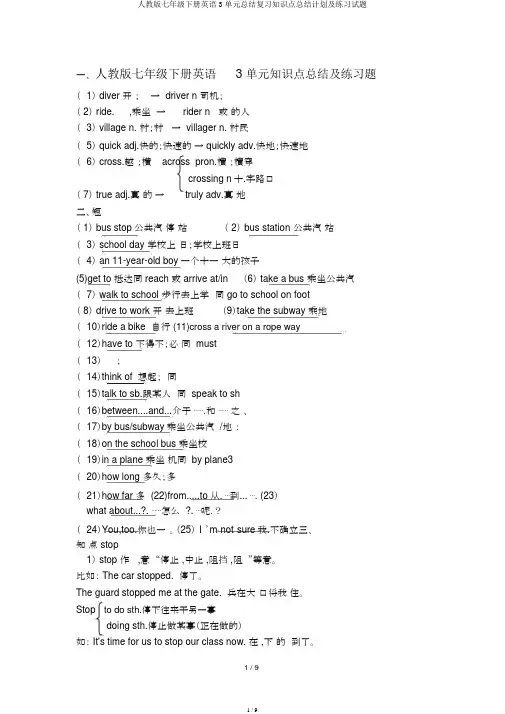
一、人教版七年级下册英语 3 单元知识点总结及练习题(1) diver 开;→ driver n 司机;( 2) ride. ,乘坐→rider n 或的人(3) village n.村;村→ villager n. 村民(5) quick adj.快的;快速的→ quickly adv.快地;快速地(6) cross.越;横 across pron.横;横穿crossing n十.字路口( 7) true adj.真的→truly adv.真地二、短( 1) bus stop公共汽停站(2)bus station公共汽站(3) school day 学校上日;学校上班日(4) an 11-year-old boy一个十一大的孩子(5)get to 抵达同 reach 或 arrive at/in(6)take a bus乘坐公共汽(7) walk to school 步行去上学同 go to school on foot( 8) drive to work 开去上班(9)take the subway乘地(10)ride a bike 自行(11)cross a river on a rope way(12)have to 不得不;必同 must(13);(14)think of 想起;同(15)talk to sb.跟某人同 speak to sh(16)between....and...介于⋯⋯.和⋯⋯之、(17)by bus/subway乘坐公共汽 /地:(18)on the school bus 乘坐校(19)in a plane 乘坐机同 by plane3(20)how long 多久;多(21)how far 多 (22)from.....to 从. ⋯到... ⋯. (23)what about...?. ⋯⋯怎么 ?. ⋯呢.?(24)You,too.你也一。
(25) I ’m not sure我.不确立三、知点 stop1) stop 作 ,意“停止 ,中止 ,阻挡 ,阻”等意。
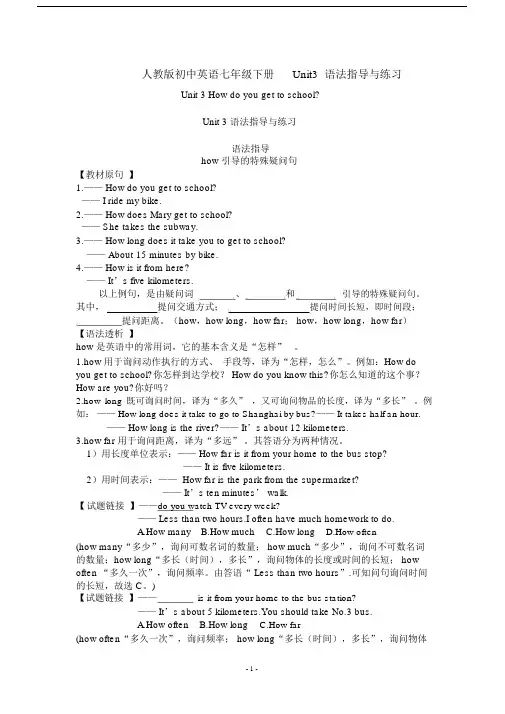
人教版初中英语七年级下册Unit3 语法指导与练习Unit 3 How do you get to school?Unit 3 语法指导与练习语法指导how 引导的特殊疑问句【教材原句】1.—— How do you get to school?—— I ride my bike.2.—— How does Mary get to school?—— She takes the subway.3.—— How long does it take you to get to school?—— About 15 minutes by bike.4.—— How is it from here?—— It’s five kilometers.以上例句,是由疑问词、和引导的特殊疑问句。
其中,提问交通方式;提问时间长短,即时间段;提问距离。
(how,how long,how far; how,how long,how far)【语法透析】how 是英语中的常用词,它的基本含义是“怎样”。
1.how 用于询问动作执行的方式、手段等,译为“怎样,怎么”。
例如:How do you get to school?你怎样到达学校? How do you know this?你怎么知道的这个事?How are you?你好吗?2.how long 既可询问时间,译为“多久” ,又可询问物品的长度,译为“多长”。
例如:—— How long does it take to go to Shanghai by bus?—— It takes half an hour.—— How long is the river?—— It’s about 12 kilometers.3.how far 用于询问距离,译为“多远”。
其答语分为两种情况。
1)用长度单位表示:—— How far is it from your home to the bus stop?—— It is five kilometers.2)用时间表示:—— How far is the park from the supermarket?—— It’s ten minutes’ walk.【试题链接】——do you watch TV every week?—— Less than two hours.I often have much homework to do.A.How manyB.How muchC.How longD.How often(how many“多少”,询问可数名词的数量; how much“多少”,询问不可数名词的数量;how long“多长(时间),多长”,询问物体的长度或时间的长短; how often “多久一次”,询问频率。

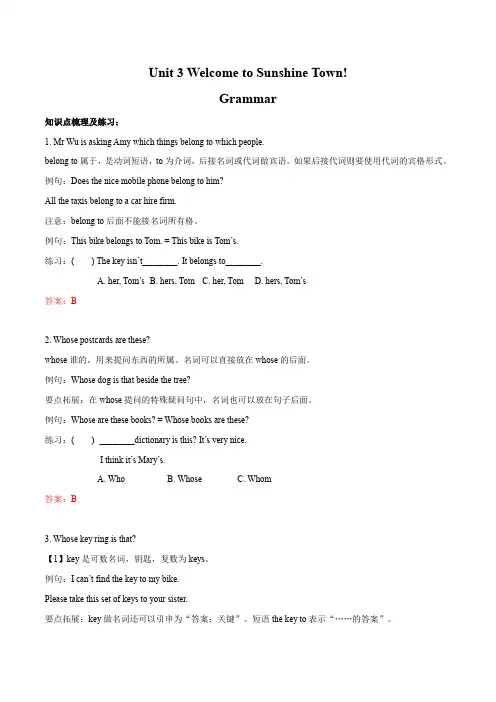
Unit 3 Welcome to Sunshine Town!Grammar知识点梳理及练习:1. Mr Wu is asking Amy which things belong to which people.belong to属于,是动词短语,to为介词,后接名词或代词做宾语。
如果后接代词则要使用代词的宾格形式。
例句:Does the nice mobile phone belong to him?All the taxis belong to a car hire firm.注意:belong to后面不能接名词所有格。
例句:This bike belongs to Tom. = This bike is Tom’s.练习:( ) The key isn’t________. It belongs to________.A. her, Tom’sB. hers, TomC. her, TomD. hers, Tom’s答案:B2. Whose postcards are these?whose谁的,用来提问东西的所属。
名词可以直接放在whose的后面。
例句:Whose dog is that beside the tree?要点拓展:在whose提问的特殊疑问句中,名词也可以放在句子后面。
例句:Whose are these books? = Whose books are these?练习:( ) -________dictionary is this? It’s very nice.-I think it’s Mary’s.A. WhoB. WhoseC. Whom答案:B3. Whose key ring is that?【1】key是可数名词,钥匙,复数为keys。
例句:I can’t find the key to my bike.Please take this set of keys to your sister.要点拓展:key做名词还可以引申为“答案;关键”。
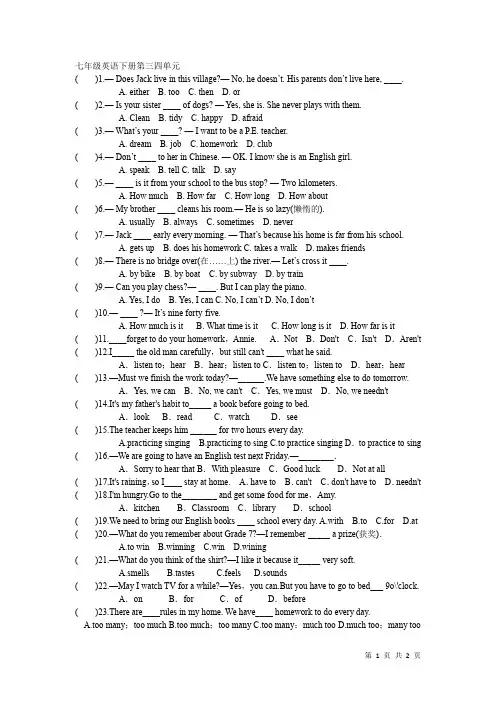
七年级英语下册第三四单元( )1.— Does Jack live in this village?— No, he doesn’t. His parents don’t live here, ____.A. eitherB. tooC. thenD. or( )2.— Is your sister ____ of dogs? — Yes, she is. She never plays with them.A. CleanB. tidyC. happyD. afraid( )3.— What’s your ____? — I want to be a P.E. teacher.A. dreamB. jobC. homeworkD. club( )4.— Don’t ____ to her in Chinese. — OK. I know she is an English girl.A. speakB. tellC. talkD. say( )5.— ____ is it from your school to the bus stop? — Two kilometers.A. How muchB. How farC. How longD. How about( )6.— My brother ____ cleans his room.— He is so lazy(懒惰的).A. usuallyB. alwaysC. sometimesD. never( )7.— Jack ____ early every morning. — That’s because his home is far from his school.A. gets upB. does his homeworkC. takes a walkD. makes friends( )8.— There is no bridge over(在……上) the river.— Let’s cross it ____.A. by bikeB. by boatC. by subwayD. by train( )9.— Can you play chess?— ____. But I can play the piano.A. Yes, I doB. Yes, I canC. No, I can’tD. No, I don’t( )10.— ____ ?— It’s nine forty-five.A. How much is itB. What time is itC. How long is itD. How far is it ( )11.____forget to do your homework,Annie. A.Not B.Don't C.Isn't D.Aren't ( )12.I_____ the old man carefully,but still can't ____ what he said.A.listen to;hear B.hear;listen to C.listen to;listen to D.hear;hear ( )13.—Must we finish the work today?—______.We have something else to do tomorrow.A.Yes, we can B.No, we can't C.Yes, we must D.No, we needn't( )14.It's my father's habit to_____ a book before going to bed.A.look B.read C.watch D.see( )15.The teacher keeps him ______ for two hours every day.A.practicing singingB.practicing to singC.to practice singing D.to practice to sing ( )16.—We are going to have an English test next Friday.—________.A.Sorry to hear that B.With pleasure C.Good luck D.Not at all( )17.It's raining,so I____ stay at home. A.have to B.can't C.don't have to D.needn't ( )18.I'm hungry.Go to the________ and get some food for me,Amy.A.kitchen B.Classroom C.library D.school( )19.We need to bring our English books ____ school every day. A.with B.to C.for D.at ( )20.—What do you remember about Grade 7?—I remember _____ a prize(获奖).A.to winB.winningC.winD.wining( )21.—What do you think of the shirt?—I like it because it_____ very soft.A.smellsB.tastesC.feelsD.sounds( )22.—May I watch TV for a while?—Yes,you can.But you have to go to bed___ 9o\'clock.A.on B.for C.of D.before( )23.There are____rules in my home. We have____ homework to do every day.A.too many;too muchB.too much;too manyC.too many;much tooD.much too;many too24.Do you want to ______________________ after work?你下班后想散步吗?(take)25.She can _____________ in the group.她能在这个组里弹吉他。
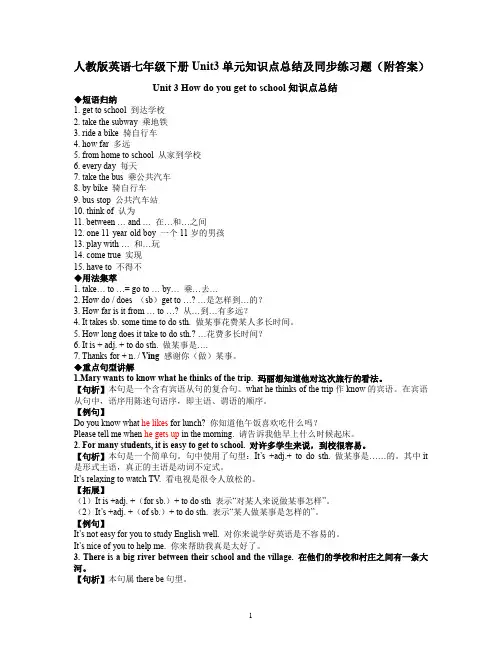
人教版英语七年级下册Unit3单元知识点总结及同步练习题(附答案)Unit 3 How do you get to school知识点总结◆短语归纳1. get to school 到达学校2. take the subway 乘地铁3. ride a bike 骑自行车4. how far 多远5. from home to school 从家到学校6. every day 每天7. take the bus 乘公共汽车8. by bike 骑自行车9. bus stop 公共汽车站10. think of 认为11. between … and … 在…和…之间12. one 11-year-old boy 一个11岁的男孩13. play with … 和…玩14. come true 实现15. have to 不得不◆用法集萃1. take… to …= go to … by… 乘…去…2. How do / does (sb)get to …? …是怎样到…的?3. How far is it from … to …? 从…到…有多远?4. It takes sb. some time to do sth. 做某事花费某人多长时间。
5. How long does it take to do sth.? …花费多长时间?6. It is + adj. + to do sth. 做某事是….7. Thanks for + n. / Ving 感谢你(做)某事。
◆重点句型讲解1.Mary wants to know what he thinks of the trip. 玛丽想知道他对这次旅行的看法。
【句析】本句是一个含有宾语从句的复合句。
what he thinks of the trip作know的宾语。
在宾语从句中,语序用陈述句语序,即主语、谓语的顺序。
【例句】Do you know what he likes for lunch? 你知道他午饭喜欢吃什么吗?Please tell me when he gets up in the morning. 请告诉我他早上什么时候起床。
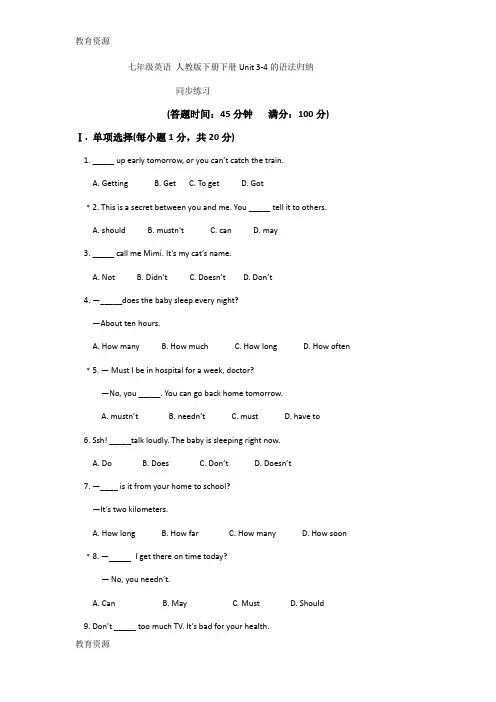
七年级英语人教版下册下册Unit 3-4的语法归纳同步练习(答题时间:45分钟满分:100分) Ⅰ. 单项选择(每小题1分,共20分)1. _____ up early tomorrow, or you can’t catch the train.A. GettingB. GetC. To getD. Got﹡2. This is a secret between you and me. You _____ tell it to others.A. shouldB. mustn’tC. canD. may3. _____ call me Mimi. It’s my cat’s name.A. NotB. Didn’tC. Doesn’tD. Don’t4. —_____does the baby sleep every night?—About ten hours.A. How manyB. How muchC. How longD. How often ﹡5. — Must I be in hospital for a week, doctor?—No, you _____. You can go back home tomorrow.A. mustn’tB. needn’tC. mustD. have to6. Ssh! _____talk loudly. The baby is sleeping right now.A. DoB. DoesC. Don’tD. Doesn’t7. —____ is it from your home to school?—It’s two kilometers.A. How longB. How farC. How manyD. How soon ﹡8. —I get there on time today?—No, you needn’t.A. CanB. MayC. MustD. Should9. Don’t _____ too much TV. It’s bad for your health.A. watchB. watchedC. watchingD. to watch10. —Must we finish copying all these articles this morning?— No, you .A. mustn’tB. haven’tC. not have toD. don’t have to11. —_____ does the girl go to work?—By bus.A. WhereB. WhenC. HowD. What﹡12. Please don’t park here. There’s a sign “ _______”.A. Not parkB. No parkingC. Don’t parkingD. Not parking ﹡13. You ___ be late for school again next time.A. mustn’tB. needn’tC. don’t have toD. don’t need to﹡14. —_____will you buy a new bike?—In two months.A. How oftenB. How farC. How longD. How soon15. _____in bed. It’s bad for your eyes.A. Not to readB. Don’t readC. Don’t to readD. Not read﹡16. His arm is all right. He_____ go and see the doctor.A. has not toB. don’t have toC. haven’t toD. doesn’t have to17. ______ more, and you’ll improve your spoken English.A. SpeakB. SpeaksC. SpeakingD. To speak﹡﹡18. ______ tell a lie.A. HardlyB. NotC. NoD. Never19. Please ______ look outside. Look at the blackboard.A. notB. don’tC. aren’tD. can’t﹡﹡20. —Please bring your homework to school tomorrow, Steven.—OK, I _____.A. willB. won’tC. doD. don’t﹡﹡Ⅱ. 完形填空(每小题1分,共10分)Our school has a library and many kinds of 1 are in it. They are 2 science, history, language, and so on. You 3 read books in the library, and you can 4 borrow them from it. But you have to obey(遵守) some 5 .First, when you read in the library, you have to be quiet. You can’t talk with others 6 , and you can’t use your mobile phone. Second, don’t take your bags 7 the library. Third, don’t eat 8 drink in the library. 9 you want to borrow books from the library, you have to take good care of them and give them back on time. If you lose the books, you 10 pay for them.1. A. people B. books C. desks D. news2. A. for B. in C. on D. from3. A. can B. have to C. can’t D. don’t have to4. A. too B. each C. never D. also5. A. rules B. shows C. words D. people6. A. quickly B. loudly C. slowly D. quietly7. A. at B. on C. into D. for8. A. or B. and C. so D. then9. A. Because B. Where C. When D. If10. A. have B. have to C. needn’t D. can﹡﹡Ⅲ. 阅读理解(每小题2分,共20分)AWe find many different kinds of animals on the earth. Some animals, such as tigers and elephants, live in big forests. They are called wild animals. Some others, like cats and dogs live with people and they are called domestic animals.Animals are important to people. People catch wild animals for fur and meat. Domestic animals give us food, too. We get milk from cows and eggs from chickens. Without them, life will be hard.Sheep and pigs give people food and fur. Skins of some animals can be made into coats orshoes. Dogs can help people a lot. They can do many things for us.So everyone has to know animals are our friends and we can’t live without the animals.1. Which are wild animals?A. Tigers and horses.B. Elephants and tigers.C. Sheep and dogs.D. Cows and cats.2. Why do people catch wild animals?A. For fur and meat.B. They are cute.C. They like them.D. They are friendly.3. ______ give us different kinds of food.A. Only wild animalsB. Only domestic animalsC. Cows and pigsD. Both A and B4. Some animals’ skins can be made into ______.A. picturesB. foodC. housesD. coats and shoes5. What does the underlined word “domestic” mean?A. 家庭的B. 驯养的C. 温和的D. 室内的BIn most schools, all students must wear school uniforms when they are at school. But not every student likes the school uniform.Li Jia, a 13-year-old girl from No. 9 Middle School, said, “I don’t like my school uniform at all. It is too ugly. I think young girls should wear some colorful clothes. But, I have to wear it every day.”However, Su Yang, also a middle school student, has different opinions. He said, “I like my school uniform. It is very beautiful. It is a symbol of my school and I like my school very much.”Mr. Chen, a teacher, told the reporter, “It’s good for the students to wear uniforms. It saves a lot of time and money. In the past, my daughter spent much time on her clothes. But now, she seldom (很少) asks me to buy clothes for her because she has to wear the school uniform.”Do you like your school uniform? Welcome to write to us.6. Most middle school students must wear the school uniform because ______.A. their parents ask them to do soB. the uniforms are beautifulC. they don’t have money to buy other clothesD. it’s the school rule7. What do you know about Li Jia?A. She doesn’t like the uniform because it is expensive.B. She is an ugly girl.C. She doesn’t like her school uniform at all.D. She never wears her uniform.8. What does Su Yang think of his school uniform?A. He thinks it is very beautiful.B. He thinks it is very ugly.C. He doesn’t like it.D. He likes a symbol.9. The underlined word “opinions” probably means ______in Chinese.A. 校服B. 看法C. 情况D. 成绩10. From the passage, we know that ______.A. most students like their uniformsB. most students don’t like their uniformsC. different people have different opinions about their uniformsD. uniforms are very popular in ChinaⅣ. 句型转换(每小题2分,共20分)1. You must get home early. (改为祈使句)______ _____ early.2. I live about five kilometers from school. (对划线部分提问)_____ _____ do you live from school?3. You can’t be late for school again. (改为祈使句)_____ _____ late for school again.4. Tom has to practice the guitar this afternoon. (对划线部分提问)_____ _____ Tom have to do this afternoon?﹡﹡5. Can I have a look at your new dress? (改为祈使句)_____ me _____ a look at your new dress.6. I have to help my mom make breakfast. (改为一般疑问句)_____ you _____ to help your mom make breakfast?﹡7. No photos! (改为祈使句)_____ _____ photos here!8. Frank usually goes to school by bike. (对划线部分提问)_____ _____ Frank usually go to school?﹡﹡9.We go to the zoo together. (改为祈使句)_____ _____ to the zoo together.﹡﹡10. Le t’s play ping-pong tomorrow. (改为否定句)_____ _____ play ping-pong tomorrow.Ⅴ. 补全对话(每小题2分,共10分)从方框中选择恰当的句子补全对话,其中两项多余A: 1B: I live in Beach Garden.A: 2B: I usually get to school by bus.A: 3B: It’s about two miles.A: 4B: It takes ten minutes.A: 5B: It is fast, but it is too crowded on the bus.Ⅵ. 书面表达(20分)下表是演员Dreamer一天的主要活动。
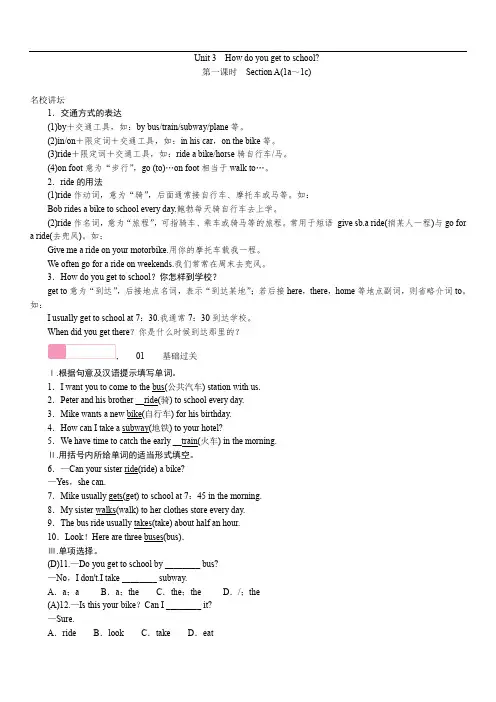
Unit 3How do you get to school?第一课时Section A(1a~1c)名校讲坛1.交通方式的表达(1)by+交通工具,如:by bus/train/subway/plane等。
(2)in/on+限定词+交通工具,如:in his car,on the bike等。
(3)ride+限定词+交通工具,如:ride a bike/horse骑自行车/马。
(4)on foot意为“步行”,go (to)…on foot相当于walk to…。
2.ride的用法(1)ride作动词,意为“骑”,后面通常接自行车、摩托车或马等。
如:Bob rides a bike to school every day.鲍勃每天骑自行车去上学。
(2)ride作名词,意为“旅程”,可指骑车、乘车或骑马等的旅程。
常用于短语give sb.a ride(捎某人一程)与go fora ride(去兜风)。
如:Give me a ride on your motorbike.用你的摩托车载我一程。
We often go for a ride on weekends.我们常常在周末去兜风。
3.How do you get to school?你怎样到学校?get to意为“到达”,后接地点名词,表示“到达某地”;若后接here,there,home等地点副词,则省略介词to。
如:I usually get to school at 7:30.我通常7:30到达学校。
When did you get there?你是什么时候到达那里的?,01基础过关Ⅰ.根据句意及汉语提示填写单词。
1.I want you to come to the bus(公共汽车) station with us.2.Peter and his brother __ride(骑) to school every day.3.Mike wants a new bike(自行车) for his birthday.4.How can I take a subway(地铁) to your hotel?5.We have time to catch the early __train(火车) in the morning.Ⅱ.用括号内所给单词的适当形式填空。
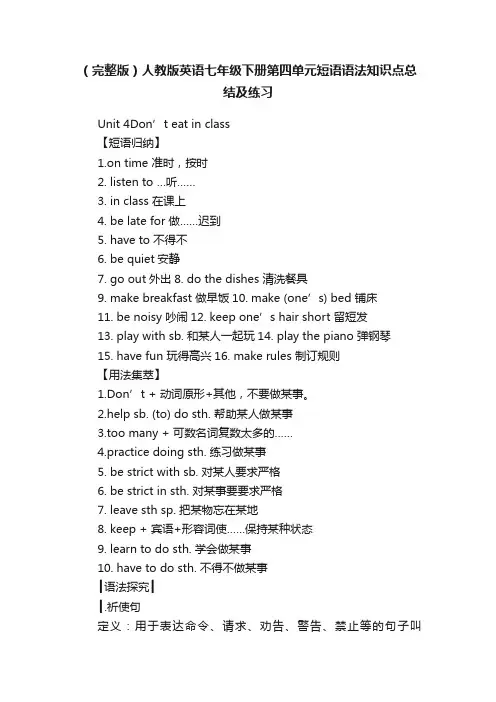
(完整版)人教版英语七年级下册第四单元短语语法知识点总结及练习Unit 4Don’t eat in class【短语归纳】1.on time 准时,按时2. listen to …听……3. in class 在课上4. be late for 做……迟到5. have to 不得不6. be quiet安静7. go out外出8. do the dishes 清洗餐具9. make breakfast 做早饭10. make (one’s) bed 铺床11. be noisy 吵闹12. keep one’s hair short 留短发13. play with sb. 和某人一起玩14. play the piano 弹钢琴15. have fun 玩得高兴16. make rules 制订规则【用法集萃】1.Don’t + 动词原形+其他,不要做某事。
2.help sb. (to) do sth. 帮助某人做某事3.too many + 可数名词复数太多的……4.practice doing sth. 练习做某事5. be strict with sb. 对某人要求严格6. be strict in sth. 对某事要要求严格7. leave sth sp. 把某物忘在某地8. keep + 宾语+形容词使……保持某种状态9. learn to do sth. 学会做某事10. have to do sth. 不得不做某事┃语法探究┃┃.祈使句定义:用于表达命令、请求、劝告、警告、禁止等的句子叫__________句。
时态:使用______________时态。
结构:动词原形+其他成分+please. 否定祈使句在动词原形前面加__________ 。
如:Be quiet in the classroom, please.在教室里请保持安静。
Don't fight. 不要打架┃.情态动词have to 和must1.情态动词have to和must都表示“__________”的意思。
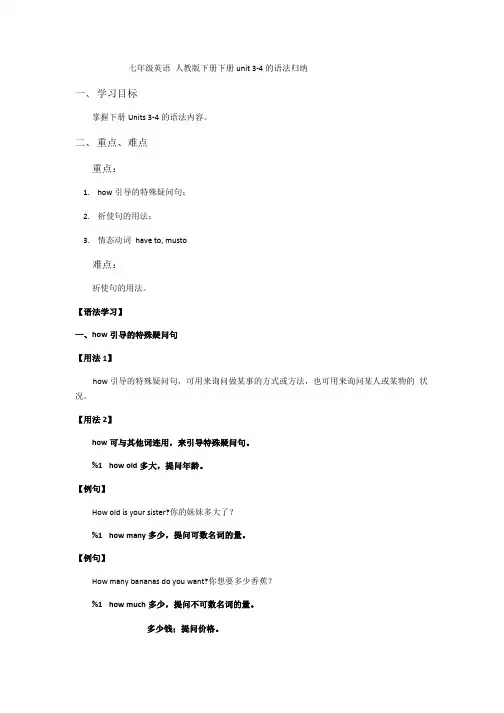
七年级英语人教版下册下册unit 3-4的语法归纳一、学习目标掌握下册Units 3-4的语法内容。
二、重点、难点重点:1.how引导的特殊疑问句;2.祈使句的用法;3.情态动词have to, musto难点:祈使句的用法。
【语法学习】一、how引导的特殊疑问句【用法1】how引导的特殊疑问句,可用来询问做某事的方式或方法,也可用来询问某人或某物的状况。
【用法2】how可与其他词连用,来引导特殊疑问句。
%1how old多大,提问年龄。
【例句】How old is your sister?你的妹妹多大了?%1how many多少,提问可数名词的量。
【例句】How many bananas do you want?你想要多少香蕉?%1how much多少,提问不可数名词的量。
多少钱;提问价格。
【例句】How much water is there in the bottle?瓶子里有多少水?How much is the sweater?这件毛衣多少钱?%1how long多长时间,提问一段时间。
多长,提问物体的长度。
【例句】How long does it take you to get home?你到家要花费多长时间?How long is the classroom?这教室多长?%1how far多远,提问距离。
【例句】How far is the park from here?公园离这儿多远?【拓展】%1how soon多快。
【例句】How soon will he be back?他多快回来?%1how often多久一次,提问频率。
【例句】How often do you go to the movie?你多久去看一次电影?【考题链接】1.一is it to the train station?一About six kilometers.A. How longB. How farC. How much D, How often答案:B思路分析:根据答语“大约六公里”可知问句询问距离,故排除A, C,D三项。
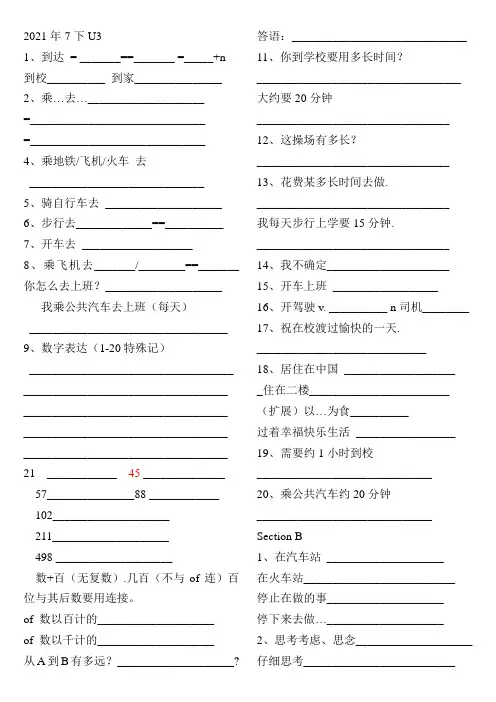
2021年7下U31、到达= _______==_______ =_____+n到校__________ 到家_______________ 2、乘…去…____________________=______________________________=______________________________4、乘地铁/飞机/火车去______________________________5、骑自行车去____________________6、步行去_____________==__________7、开车去___________________8、乘飞机去_______/________==_______你怎么去上班?____________________ 我乘公共汽车去上班(每天)__________________________________ 9、数字表达(1-20特殊记)___________________________________ ___________________________________ ___________________________________ ___________________________________ ___________________________________ 21 ____________45 ______________ 57_______________88 ____________ 102____________________211____________________498 ____________________数+百(无复数).几百(不与of连)百位与其后数要用连接。
of 数以百计的____________________of 数以千计的____________________从A到B有多远?____________________? 答语:______________________________ 11、你到学校要用多长时间?___________________________________ 大约要20分钟_________________________________ 12、这操场有多长?_________________________________ 13、花费某多长时间去做._________________________________我每天步行上学要15分钟._________________________________14、我不确定_____________________15、开车上班__________________16、开驾驶v. __________ n司机________17、祝在校渡过愉快的一天._____________________________18、居住在中国____________________住在二楼________________________ (扩展)以…为食__________过着幸福快乐生活_________________ 19、需要约1小时到校______________________________20、乘公共汽车约20分钟______________________________ Section B1、在汽车站____________________在火车站__________________________停止在做的事____________________停下来去做…____________________2、思考考虑、思念____________________仔细思考__________________________思考考虑认为…怎样__________你认为…怎么样?=__________________= _____________ ____(对某人、某事的看法)3、你认为中国人怎么样?____________________________________ __________________________________4、对于很多学生_____________________5、于…是容易/难的_________________.骑自行车是很容易的____________________________________ 6、这没有桥_____________________=== _____________________7、河水湍急_____________________河水注入大海_____________________8、过河_____________________9、乘坐索道_____________________10一个8岁的男孩___________________一个11岁的女孩_____________________ 2个月的假期_____________________ 11、害怕某人/某事___________________害怕去做/不敢做_________________害怕(担心)做…_________________恐怕…_________________12、他对我来说就像一位父亲__________________________________看起来像(外)_________________He look likes his father .(长的像)像…(性格品质)She is like her mother.(性格品质)You can’t do it like this .你不能这样做13、喜欢做…_________________ 14、…中的许多_________________我们中一些_________________她的朋友中一些(人)_____________________________ 15、他们的梦想实现____________________________有个梦想______________________梦想/梦见_____________________我想想见我妈_________________ 16、离开…去…_____________________把…落在…____________忘记带…______________________把书落在桌上____________________________忘带书______________________17、感谢你上一封电子邮件___________________________因为…感谢…______________谢谢帮助我们____________________________2021年7下U31、到达= arrive at/in ==get to =reach +n 到校get to school 到家get/arrive home2、乘…去…go to … by +交通工具=take a/an/the … to +n=go to …on/in +the /a/an…+n4、乘地铁/飞机/火车去take the subway/plane /train to +n5、骑自行车去ride a bike to …6、步行去go to …on foot==walk to7、开车去drive (a car )to …8、乘飞机去go to ..by air/by plane==fly to你怎么去上班?How do you go to work?我乘公共汽车去上班(每天)I go/get to work by bus every day.9、数字表达(1-20特殊记)one two three four five sixseven eight nine ten eleventwelve thirteen fourteen fifteensixteen seventeen eighteen nineteentwenty21 twenty –one45 forty -five57 fifty-five 88 eighty-eight102 one hundred and two211 two hundred and eleven498 four hundred and ninety-eight数+百(无复数).几百(不与of连)百位与其后数要用连接。
Unit 3 How do you get to school?1.短语归纳2.典句必背3.用法集萃(1)怎样表达出行方式:How do you get to school?❖描述出行方式时,通常会有如下几种形式注意:当交通工具的名词(如:bike, bus, train, car等)和by搭配时,它们前面不必加冠词;但当它们和on或in搭配时,它们之间要加冠词。
(2)基数词的表达法:基数词,表示数目或者数量的多少①one 到twelve,拼写和读音没有什么相似之处,无规律可言,应逐一进行记忆。
②thirteen到nineteen,表示“十几”,在个位数后加后缀-teen,读作/ti:n/。
注意thirteen, fifteen和eighteen的拼写。
③twenty到ninety,表示“几十”,以-ty结尾,但需注意下面几个词的拼写:twenty, thirty, forty, fifty, eighty。
④21~29直到91~99,表示“几十几”,用整十位加个位数表示,中间用连字符“-”把十位数与个位数连接起来。
例:21→twenty-one;35→thirty-five⑤one hundred意为“一百”,表示一百还可以用 a hundred。
要表示200~900,用“具体数字+hundred”。
⑥例:200 →two hundred;900→ nine hundred注意:❖hundred前面若有具体的数词,则要用hundred的单数形式,而且其后不能跟of,此时表达确切的数字概念。
例:There are two hundred people in the square. 广场上有两百人❖hundreds of表示“数以百计的”,此时表达模糊的数字概念。
如:There are hundreds of people in the square. 广场上有好几百人(3)How far is it from your home to school?❖from ... to ... 意为“从...到...”,表示“由一点到另一点”,可用于时间、地点、数目等。
Unit 3 How do you get to school?一、词汇集锦train ________ bus _______ subway ________ take the subway ________ride ________ bike _______ ride a bike ________ sixty ________ seventy _________ eighty ________ ninety ________ hundred _______ minute ________ far _________ kilometer ________ new ________ every _______ every day ________ by _______ by bike _______ drive ________ car _________ live_______ stop _______ think of _______cross ________ river ________ many _______ village _______ between _________ between…and…____________ bridge ________ boat ________ ropeway ________ year __________ afraid________ like _______ villager _________ leave ___________ dream ________ true ____________ come ture _______二、短语归纳1. get to school 到达学校2. take the train 乘火车3. take the subway 乘地铁4. ride a bike 骑自行车5. how do you get to school 怎么到达学校6. one hundred and five 1057. how far 多远8. how long 多长时间9. it takes sb some time to do sth 它花费某人多长时间做某事10. ride the bike to school 骑自行车到学校11. walk to , drive to ,fly to…步行去…;开车去…;坐飞机去….12. every day 每天13. I’m not sure 我不敢确信14. about= around 大约15. 10 kilometers 十公里16. good exercise 好的锻炼17. drive his car to work 开车去上班18. in his father’s car 坐父亲的车19. need about 10 minutes to get to school 需要十分钟的时间到达学校20. what do you think of…=how do you like…你觉得怎么样21. cross the river 过河22. It is easy to get to school. 到达学校很容易。
陕西省神木县大保当初级中学七年级英语下册iit3・4单元语法及二. 重点短语:坐火车/地铁靠,取决与少数 ______________________________三. 词汇辨1 ・ take/spend/pay/costspend, cost , take 和pay 都可以表示“花费”,但用法却不尽相同。
spend 的主语必须是人,常用于以下结构:(1) spend time / mone yonsth. 在........... 上花费吋间(金钱)。
例: I spent two hours o n this maths problem.这道数学题花了我两个瞄。
(2) spend time / money (in) years (in) building this bridge ・ cost 的主语是物或某种活动, (1) sth. costs (sb.)+ 金钱, of money ・ 买一台新电脑要花一大魏。
点書点 一.重点单词:take题人教新目标版must worry so担心 远需要做某事 坐船与 .... 不同骑自隼 ___________________________doing sth. 花费时间(金钱)做某事。
例: They spent two 造这座桥花了他们两年时间。
还可以表示“值”, 常见用法如下:某物花了(某人)多少钱。
例: A new computer costs a lot(2) (doing) sth. costs (sb.) +时间,某物(做某事)花了 (某人)多少时间。
例:Rememberingthese new words cost him a lot of time. 他花了大量时间才记住了这樂词。
注意:cost 的过去式及过去分词都是 cost,并且不能用于被动句。
take 后面常跟双宾语,常见用法有以下几种:(1) It takes sb. + 时间 + to do sth. 做某事花了某人多少时间。
人教版七年级下册unit3+4核心考点及语法归纳【unit 3语法】1、how 用于询问动作执行的方式、手段等,译为“怎样”。
如:—How do you usually go to school?你通常怎样去上学。
—On foot. 步行。
2、how 用于询问动作的执行程度,译为“怎样”。
如:—How do you like China?你觉得中国怎么样?—I like it very much. 非常喜欢。
3、how 用于询问身体健康状况,译为“怎么样”。
如:—How are you?你好吗?—I’m fine,thank you. 我很好,谢谢。
4、how 用在第一次见面的问候语中。
如:How do you do?你好!5、how about 用于询问或征询意见等,相当于what about ,后接名词、代词或动词的-ing 形式,译为“…怎么样”、“…好不好”。
如:I like playing football. How about you?我喜欢踢足球。
你呢?6、how many 用于询问人或物品的数量,后接可数名词的复数形式,译为“多少”。
如:How many students are there in your class?你们班有多少名学生?There are sixty-five. 六十五名。
7、how much 既可询问物品数量,后接不可数名词,译为“多少”;又可询问物品价格,译为“多少钱”。
如:---How much rice do you want?---Five kilograms.—How much is the coat?这件大衣多少钱?—It’s fifty dollars.五十美元8、how old 用于询问年龄,译为“多大”。
如:—How old are you?你多大了?—I’m twelve. 我十二岁。
9、how far 用于询问距离,译为“多远”。
如:—How far is it from here to the station?从这里到车站有多远?—About three hundred metres. 大约三百米。
英语复习资料七年级下册U n i t3-4重点解析及练习(共6页)--本页仅作为文档封面,使用时请直接删除即可----内页可以根据需求调整合适字体及大小--七年级下册Unit3-4重点解析及练习英语复习资料Unit 3 Why do you like koala bears一.重点词1、kind of 有点,稍还有“种类”的意思各种各样的 all kinds of2、with 跟,同,和…在一起 I usually play chess with my father.3、day和night 是一对反义词,day 表示白天或一天,night表示夜或夜晚。
通常说in the day, during the day, at night。
4、leaf n. 叶子复数形式为:leaves, 类似的变化还有:wife—wives, wolf—wolves,knife—knives,scarf---scarfs(scarves)等。
二. 交际用语1. Why do you like pandas Because they’re very clever.2. Why does he like koalas Because th ey’re kind of interesting.3. Where are lions from They are from South Africa.4. What other animals do you like I like dogs, too. Why Because they’re friendly and clever. 5.Let’s see the pandas first.四. 语法知识特殊疑问句通常以“what”、“who”、“which”、“when”、“where”、“how”、“how old”、“how many”等开头,对某一具体问题进行提问。
Unit 4 I want to be an actor.一.短语:1、 want to do sth 想要作某事=would like to do sth=feel like doing sth..2 、give sb sth = give sth to sb 给某人某物 / 把某物给某人3 、help sb do sth 帮助某人作某事4 、help sb with sth 帮助某人谋事5 、talk with/ to sb 和----谈话6、 be busy doing sth 忙于做某事7 、in a hospital 在医院8、 work/ study hard 努力工9、 Evening Newspaper 晚报二.重点句式及注意事项:1 询问职业的特殊疑问词是what;有三种主要句式(1) What + is / are + sb(2)What + does/ do + sb + do(3)What + is/ are + 名所有格/ 形物主代词 + job三.本单元中的名词复数。
七年级英语人教版下册下册Unit 3-4的语法归纳同步练习(答题时间:45分钟满分:100分)Ⅰ. 单项选择(每小题1分,共20分)1. _____ up early tomorrow,or you can’t catch the train.A. GettingB. GetC. To getD. Got﹡2. This is a secret between you and me. You _____ tell it to others.A. shouldB. mustn’tC. canD. may3. _____ call me Mimi. It’s my cat’s name.A. NotB. Didn’tC. Doesn’tD. Don’t4. —_____does the baby sleep every night?—About ten hours.A. How manyB. How muchC. How longD. How often﹡5. — Must I be in hospital for a week,doctor?—No,you _____. You can go back home tomorrow.A. mustn’tB. needn’tC. mustD. have to6. Ssh! _____talk loudly. The baby is sleeping right now.A. DoB. DoesC. Don’tD. Doesn’t7. —____ is it from your home to school?—It’s two kilometers.A. How longB. How farC. How manyD. How soon﹡8. — I get there on time today?— No,you needn’t.A. CanB. MayC. MustD. Should. It’s bad for your health.9. Don’t _____ too much TVA. watchB. watchedC. watchingD. to watch10. —Must we finish copying all these articles this morning?— No,you .A. mustn’tB. haven’tC. not have toD. don’t have to11. —_____ does the girl go to work?—By bus.A. WhereB. WhenC. HowD. What﹡12. Please don’t park here. There’s a sign “ _______”.A. Not parkB. No parkingC. Don’t parkingD. Not parking﹡13. You ___ be late for school again next time.A. mustn’tB. needn’tC. don’t have toD. don’t need to﹡14. —_____will you buy a new bike?—In two months.A. How oftenB. How farC. How longD. How soon15. _____in bed. It’s bad for your eyes.A. Not to readB. Don’t readC. Don’t to readD. Not read﹡16. His arm is all right. He_____ go and see the doctor.have to C. haven’t to D. doesn’t have toA. has not toB. don’t17. ______ more,and you’ll improve your spoken English.A. SpeakB. SpeaksC. SpeakingD. To speak﹡﹡18. ______ tell a lie.A. HardlyB. NotC. NoD. Never19. Please ______ look outside. Look at the blackboard.A. notB. don’tC. aren’tD. can’t﹡﹡20. —Please bring your homework to school tomorrow,Steven.—OK,I _____.A. willB. won’tC. doD. don’t﹡﹡Ⅱ. 完形填空(每小题1分,共10分)Our school has a library and many kinds of 1 are in it. They are 2 science,history,language,and so on. You 3 read books in the library,and you can 4 borrow them from it. But you have to obey(遵守) some 5 .6 ,First,when you read in the library,you have to be quiet. You can’t talk with others,don’t take your bags 7 the library. Third,and you can’t use your mobile phone. Seconddon’t eat 8 drink in the library. 9 you want to borrow books from the library,you have to take good care of them and give them back on time. If you lose the books,you 10 pay for them.1. A. people B. books C. desks D. news2. A. for B. in C. on D. from3. A. can B. have to C. can’t D. don’t have to4. A. too B. each C. never D. also5. A. rules B. shows C. words D. people6. A. quickly B. loudly C. slowly D. quietly7. A. at B. on C. into D. for8. A. or B. and C. so D. then9. A. Because B. Where C. When D. If10. A. have B. have to C. needn’t D. can﹡﹡Ⅲ. 阅读理解(每小题2分,共20分)AWe find many different kinds of animals on the earth. Some animals,such as tigers and elephants,live in big forests. They are called wild animals. Some others,like cats and dogs livewith people and they are called domestic animals.Animals are important to people. People catch wild animals for fur and meat. Domesticanimals give us food,too. We get milk from cows and eggs from chickens. Without them,lifewill be hard.Sheep and pigs give people food and fur. Skins of some animals can be made into coats orshoes. Dogs can help people a lot. They can do many things for us.So everyone has to know animals are our friends and we can’t live without the animals.1. Which are wild animals?A. Tigers and horses.B. Elephants and tigers.C. Sheep and dogs.D. Cows and cats.2. Why do people catch wild animals?A. For fur and meat.B. They are cute.C. They like them.D. They are friendly.3. ______ give us different kinds of food.A. Only wild animalsB. Only domestic animalsC. Cows and pigsD. Both A and B4. Some animals’ skins can be made into ______.A. picturesB. foodC. housesD. coats and shoes5. What does the underlined word “domestic” mean?A. 家庭的B. 驯养的C. 温和的D. 室内的BIn most schools,all students must wear school uniforms when they are at school. But notevery student likes the school uniform.Li Jia,a 13-year-old girl from No. 9 Middle School,said,“I don’t like my school uniformat all. It is too ugly. I think young girls should wear some colorful clothes. But,I have to wear itevery day.”However,Su Yang,also a middle school student,has different opinions. He said,“I likemy school uniform. It is very beautiful. It is a symbol of my school and I like my school verymuch.”Mr. Chen, a teacher,told the reporter,“It’s good for the students to wear uniforms. Itsaves a lot of time and money. In the past,my daughter spent much time on her clothes. But now,she seldom (很少) asks me to buy clothes for her because she has to wear the school uniform.”Do you like your school uniform? Welcome to write to us.6. Most middle school students must wear the school uniform because ______.A. their parents ask them to do soB. the uniforms are beautifulC. they don’t have money to buy other clothesD. it’s the school rule7. What do you know about Li Jia?A. She doesn’t like the uniform because it is expensive.B. She is an ugly girl.C. She doesn’t like her school uniform at all.D. She never wears her uniform.8. What does Su Yang think of his school uniform?A. He thinks it is very beautiful.B. He thinks it is very ugly.C. He doesn’t like it.D. He likes a symbol.9. The underlined word “opinions” probably means ______in Chinese.A. 校服B. 看法C. 情况D. 成绩10. From the passage,we know that ______.A. most students like their uniformsB. most students don’t like their uniformsC. different people have different opinions about their uniformsD. uniforms are very popular in ChinaⅣ. 句型转换(每小题2分,共20分)1. You must get home early. (改为祈使句)______ _____ early.2. I live about five kilometers from school. (对划线部分提问)_____ _____ do you live from school?3. You can’t be late for school again. (改为祈使句)_____ _____ late for school again.4. Tom has to practice the guitar this afternoon. (对划线部分提问)_____ _____ Tom have to do this afternoon?﹡﹡5. Can I have a look at your new dress? (改为祈使句) _____ me _____ a look at your new dress.6. I have to help my mom make breakfast. (改为一般疑问句)_____ you _____ to help your mom make breakfast?﹡7. No photos! (改为祈使句)_____ _____ photos here!8. Frank usually goes to school by bike. (对划线部分提问)_____ _____ Frank usually go to school?﹡﹡9.We go to the zoo together. (改为祈使句)_____ _____ to the zoo together.play ping-pong tomorrow. (改为否定句)﹡﹡10. Let’s_____ _____ play ping-pong tomorrow.Ⅴ. 补全对话(每小题2分,共10分)从方框中选择恰当的句子补全对话,其中两项多余A: 1B: I live in Beach Garden.A: 2B: I usually get to school by bus.A: 3B: It’s about two miles.A: 4B: It takes ten minutes.A: 5B: It is fast,but it is too crowded on the bus.Ⅵ. 书面表达(20分)下表是演员Dreamer一天的主要活动。
七年级英语人教版下册下册Unit 3-4的语法归纳同步练习(答题时间:45分钟满分:100分)Ⅰ. 单项选择(每小题1分,共20分)1. _____ up early tomorrow, or you can’t catch the train.A. GettingB. GetC. To getD. Got﹡2. This is a secret between you and me. You _____ tell it to others.A. shouldB. mustn’tC. canD. may3. _____ call me Mimi. It’s my cat’s name.A. NotB. Didn’tC. Doesn’tD. Don’t4. —_____does the baby sleep every night?—About ten hours.A. How manyB. How muchC. How longD. How often ﹡5. — Must I be in hospital for a week, doctor?—No, you _____. You can go back home tomorrow.A. mustn’tB. needn’tC. mustD. have to6. Ssh! _____talk loudly. The baby is sleeping right now.A. DoB. DoesC. Don’tD. Doesn’t7. —____ is it from your home to school?—It’s two kilometers.A. How longB. How farC. How manyD. How soon ﹡8. — I get there on time today?— No, you needn’t.A. CanB. MayC. MustD. Should9. Don’t _____ too much TV. It’s bad for your health.A. watchB. watchedC. watchingD. to watch10. —Must we finish copying all these articles this morning?— No, you .A. mustn’tB. haven’tC. not have toD. don’t have to11. —_____ does the girl go to work?—By bus.A. WhereB. WhenC. HowD. What﹡12. Please don’t park here. There’s a sign “ _______”.A. Not parkB. No parkingC. Don’t parkingD. Not parking ﹡13. You ___ be late for school again next time.A. mustn’tB. needn’tC. don’t have toD. don’t need to﹡14. —_____will you buy a new bike?—In two months.A. How oftenB. How farC. How longD. How soon15. _____in bed. It’s bad for your eyes.A. Not to readB. Don’t readC. Don’t to readD. Not read﹡16. His arm is all right. He_____ go and see the doctor.A. has not toB. don’t have toC. haven’t toD. doesn’t have to17. ______ more, and you’ll improve your spoken English.A. SpeakB. SpeaksC. SpeakingD. To speak﹡﹡18. ______ tell a lie.A. HardlyB. NotC. NoD. Never19. Please ______ look outside. Look at the blackboard.A. notB. don’tC. aren’tD. can’t﹡﹡20. —Please bring your homework to school tomorrow, Steven.—OK, I _____.A. willB. won’tC. doD. don’t﹡﹡Ⅱ. 完形填空(每小题1分,共10分)Our school has a library and many kinds of 1 are in it. They are 2 science, history, language, and so on. You 3 read books in the library, and you can 4 borrow them from it. But you have to obey(遵守) some 5 .First, when you read in the library, you have to be quiet. You can’t talk with others 6 , and you can’t use your mobile phone. Second, don’t take your bags 7 the library. Third, don’t eat 8 drink in the library. 9 you want to borrow books from the library, you have to take good care of them and give them back on time. If you lose the books, you 10 pay for them.1. A. people B. books C. desks D. news2. A. for B. in C. on D. from3. A. can B. have to C. can’t D. don’t have to4. A. too B. each C. never D. also5. A. rules B. shows C. words D. people6. A. quickly B. loudly C. slowly D. quietly7. A. at B. on C. into D. for8. A. or B. and C. so D. then9. A. Because B. Where C. When D. If10. A. have B. have to C. needn’t D. can﹡﹡Ⅲ. 阅读理解(每小题2分,共20分)AWe find many different kinds of animals on the earth. Some animals, such as tigers and elephants, live in big forests. They are called wild animals. Some others, like cats and dogs live with people and they are called domestic animals.Animals are important to people. People catch wild animals for fur and meat. Domestic animals give us food, too. We get milk from cows and eggs from chickens. Without them, life will be hard.Sheep and pigs give people food and fur. Skins of some animals can be made into coats orshoes. Dogs can help people a lot. They can do many things for us.So everyone has to know animals are our friends and we can’t live without the animals.1. Which are wild animals?A. Tigers and horses.B. Elephants and tigers.C. Sheep and dogs.D. Cows and cats.2. Why do people catch wild animals?A. For fur and meat.B. They are cute.C. They like them.D. They are friendly.3. ______ give us different kinds of food.A. Only wild animalsB. Only domestic animalsC. Cows and pigsD. Both A and B4. Some animals’ skins can be made into ______.A. picturesB. foodC. housesD. coats and shoes5. What does the underlined word “domestic” mean?A. 家庭的B. 驯养的C. 温和的D. 室内的BIn most schools, all students must wear school uniforms when they are at school. But not every student likes the school uniform.Li Jia, a 13-year-old girl from No. 9 Middle School, said, “I don’t like my school uniform at all. It is too ugly. I think young girls should wear some colorful clothes. But, I have to wear it every day.”However, Su Yang, also a middle school student, has different opinions. He said, “I like my school uniform. It is very beautiful. It is a symbol of my school and I like my school very much.”Mr. Chen, a teacher, told the reporter, “It’s good for the students to wear uniforms. It saves a lot of time and money. In the past, my daughter spent much time on her clothes. But now, she seldom (很少) asks me to buy clothes for her because she has to wear the school uniform.”Do you like your school uniform? Welcome to write to us.6. Most middle school students must wear the school uniform because ______.A. their parents ask them to do soB. the uniforms are beautifulC. they don’t have money to buy other clothesD. it’s the school rule7. What do you know about Li Jia?A. She doesn’t like the uniform because it is expensive.B. She is an ugly girl.C. She doesn’t like her school uniform at all.D. She never wears her uniform.8. What does Su Yang think of his school uniform?A. He thinks it is very beautiful.B. He thinks it is very ugly.C. He doesn’t like it.D. He likes a symbol.9. The underlined word “opinions” probably means ______in Chinese.A. 校服B. 看法C. 情况D. 成绩10. From the passage, we know that ______.A. most students like their uniformsB. most students don’t like their uniformsC. different people have different opinions about their uniformsD. uniforms are very popular in ChinaⅣ. 句型转换(每小题2分,共20分)1. You must get home early. (改为祈使句)______ _____ early.2. I live about five kilometers from school. (对划线部分提问)_____ _____ do you live from school?3. You can’t be late for school again. (改为祈使句)_____ _____ late for school again.4. Tom has to practice the guitar this afternoon. (对划线部分提问)_____ _____ Tom have to do this afternoon?﹡﹡5. Can I have a look at your new dress? (改为祈使句)_____ me _____ a look at your new dress.6. I have to help my mom make breakfast. (改为一般疑问句)_____ you _____ to help your mom make breakfast?﹡7. No photos! (改为祈使句)_____ _____ photos here!8. Frank usually goes to school by bike. (对划线部分提问)_____ _____ Frank usually go to school?﹡﹡9.We go to the zoo together. (改为祈使句)_____ _____ to the zoo together.﹡﹡10. Le t’s play ping-pong tomorrow. (改为否定句)_____ _____ play ping-pong tomorrow.Ⅴ. 补全对话(每小题2分,共10分)从方框中选择恰当的句子补全对话,其中两项多余A: 1B: I live in Beach Garden.A: 2B: I usually get to school by bus.A: 3B: It’s about two miles.A: 4B: It takes ten minutes.A: 5B: It is fast, but it is too crowded on the bus.Ⅵ. 书面表达(20分)下表是演员Dreamer一天的主要活动。